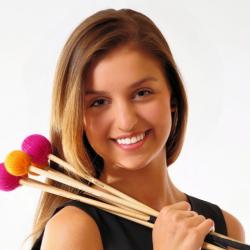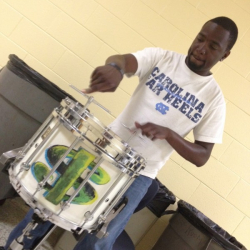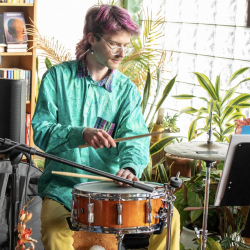Atlanta Drum Lessons In The Comfort Of Your Home
- No more rushing to studios or sitting in traffic. Our Atlanta drum teachers come to you—or connect virtually—so lessons fit right into your family’s routine. With flexible scheduling and personalized instruction, we make learning drums convenient and fun for every student.
- Lessons available 9 AM - 9 PM, seven days a week
- Top-quality teachers who make learning engaging and fun
- Lessons for all ages and skill levels
- 30-60 minutes sessions
- Complimentary student recitals for performance practice
Meet Our World-Class Atlanta Drums Teachers
At Lessons In Your Home, we proudly offer expert instruction to budding musicians across Atlanta. Our highly skilled drums teachers specialize in nurturing young talent, providing lessons tailored to each child’s unique learning style and musical interests. Whether your child is picking up a drums for the first time or looking to enhance their skills, our instructors are passionate about creating a supportive and engaging learning environment. With us, your child’s musical journey is in expert hands, ensuring they not only learn but also love every strum along the way.
How Our Atlanta Drum Lessons Work
1

2

3

Learn & Enjoy the Drums with the Best Drum Teachers in Atlanta, GA
Our approach to drum lessons isn’t one-size-fits-all. Each student brings something different to the table, and our job is to bring out their best. From basic coordination to complex beats, we create a lesson experience that blends progress with play.
Drum Lessons for Kids (Ages 5–10)
- Learn to hold sticks and play simple rhythms
- Build timing, coordination, and confidence
- Fun activities that introduce musical basics
Drum Lessons for Teens
- Explore different drum styles: rock, jazz, funk, and more
- Improve technique and play along with your favorite songs
- Prepare for school band or auditions
Drum Lessons for Adults
- Go at your own pace with zero pressure
- Play the music you actually like
- Great for brand-new players or returning drummers
Why Take Drum Lessons in Atlanta?
Drumming gives kids a powerful way to express themselves. It builds rhythm, discipline, and motor coordination—all while being incredibly fun. From marching bands to church groups to rock concerts, drums are everywhere. And there’s no better time than now to start learning.
At Lessons In Your Home, we believe music lessons should feel rewarding—not like a chore. We help students discover their rhythm, grow in confidence, and enjoy every step of the musical journey. The skills they learn today—focus, creativity, perseverance—stick with them far beyond the drum kit.
How Our Atlanta Drum Teachers Help Students Succeed
We believe great teaching goes beyond technique. Our Atlanta drum instructors focus on building trust and confidence with each student—creating an environment where learning feels approachable and progress feels natural. It’s not just about hitting the right notes; it’s about helping students stay engaged, curious, and excited to learn.
We take time to understand how each student learns best and use that to shape a personalized lesson plan. That might mean breaking things down visually, moving at a slower pace, or adjusting the structure to fit your child’s energy level. Our goal is to make lessons something your family can stick with—not another chore on the calendar.
Because we come to you (or teach virtually), consistency becomes easier—and that’s where real progress happens. Week after week, our drum teachers provide dependable structure, encouragement, and expertise that help students grow musically and personally.
What to Expect from Private Drum Lessons in Atlanta
Starting drum lessons can be both exciting and a little intimidating—especially for beginners. That’s why our Atlanta drum teachers focus on creating a welcoming, supportive environment from day one. Whether your child is new to music or you’re picking up the sticks yourself, we tailor lessons to meet you exactly where you are.
Here’s what students typically work on in their lessons:
- Learning proper stick grip and posture to prevent injury and build strong fundamentals
- Practicing basic rhythms, patterns, and fills that translate across genres
- Developing coordination between hands and feet for confident playing on a full drum kit
- Using a metronome to build timing and tempo control (key to playing with other musicians)
- Exploring musical styles like rock, funk, jazz, and pop—based on the student’s interests
- Learning how to read drum notation and count rhythms
- Building toward performance-readiness with complete songs and mini-recital opportunities
Each lesson is personalized to fit your goals—whether that’s acing a school band audition, jamming with friends, or just learning to keep a steady beat. Lessons are structured enough to track progress, but always flexible to keep things fun and fresh.
Read more: 5 Things You Can Learn On Basic Drum Lessons
Can You Play and Learn the Drums Without Noise?
Learning to play the drums can get loud. If your child (or someone else in your household) is starting drum lessons, you might be wondering how to keep the noise level down, especially at home. While soundproofing or acoustic panels can help a bit, they’re not always enough. The good news? There are several simple ways to practice more quietly without sacrificing the feel of a real drum kit.
- Try an electronic drum kit – These offer a similar feel to acoustic drums but are much quieter, making them a solid choice for apartment living or shared spaces.
- Use low-volume cymbals – Look for rubber cymbals or perforated (hole-pattern) cymbals designed to reduce sound while keeping the response.
- Swap drum heads for mesh versions – Mesh drum heads are softer, quieter, and still let you develop proper technique.
- Switch out sticks for brushes or hotrods – These alternatives make a softer impact and are great for low-volume practice.
- Muffle the bass drum – Stuffing a towel or pad inside the bass drum can help absorb sound and reduce boom.
- Use rubber practice pads – These portable pads let you practice rudiments quietly anywhere—perfect for travel or late-night sessions.
These small adjustments can make a big difference in keeping drum practice manageable for everyone at home.
Where We Offer Drum Lessons in Metro Atlanta
Our violin teachers come to you—wherever you are in the Atlanta area. We offer private, in-home violin lessons throughout the city and surrounding neighborhoods, so you can skip the traffic, studio drop-offs, and rigid schedules.
We currently serve families in: Acworth, Alpharetta, Brookhaven, Buckhead, Dallas, Druid Hills, Dunwoody, Inman Park, Marietta, Midtown, Powder Springs, Roswell, Sandy Springs, and West Paces Ferry.
Not sure if your area is covered? Just give us a call—we’re happy to check for you.
Find Atlanta Drum Teachers Near You
Thinking About Drum Lessons in Atlanta? Let’s Get Started!
Starting something new can feel intimidating, but with Lessons In Your Home, it doesn’t have to be. Our private drum lessons in Atlanta are designed to meet your child (or you!) right where you are—and help you grow from there.
Whether you’re picking up drumsticks for the first time or diving deeper into your passion, we’ll make sure the experience is fun, supportive, and truly rewarding. The beat starts here.
Drum Lesson FAQs
It’s never too early to indulge your child’s interest in playing the drums. You can foster your child’s interest in drums and musicality early on by showing them music, tapping out beats, and having them play with toy drum sets. A great age for learning and retaining skills from drum lessons is around seven and nine years old, but they can start as early as five so the fundamentals can be learned. During these certain ages, a child has greater control over their physical strength and coordination. Learning the drums requires controlled arm movements and learning how to use your arms and legs independently of one another.
Older children and teens typically enjoy learning new skills and activities, though this is also an age where they may lose interest quickly. Drum lessons with a person who cares helps counteract that loss of interest by making the learning process fun and engaging. You’re also never too old to learn how to play the drums and enjoy learning a new hobby. Adults interested in drum lessons will fully appreciate the time and dedication needed to learn a new skill.
Learning how to play the drums or any musical instrument can be a lifelong skill you continue to develop and perfect. That said, within your first 6 months with Lessons In Your Home, you can expect to start playing some songs and have a decent grasp of music theory and using proper technique. One year and three years are other milestones which will setup how you choose to pursue the art of drumming, and our instructors can help your child through these decisions.
When you are just starting out, you might want to rent your drum instead of buying one. Beginner drummers will want to weigh the financial responsibility of purchasing and maintaining a drum kit. Drum kits are not exactly cheap, so you want to make sure you are invested in learning this new skill before diving in too deep financially. However, once you become more invested in your drum lessons, you may find that owning your own drum kit pays off in the long run. Skilled drummers will definitely appreciate owning their own drum kit, especially when they get comfortable with the size and type of drums they prefer. Many drum kit rental services will provide beginners and advanced drummers alike with high-quality drum kits. You can also look into rent-to-own options where the drum kit automatically becomes yours after a preset lease term. You can also learn a lot about what type of drum kit you do or don’t want to purchase when you rent a set for a short period of time with fewer financial obligations.
Also, electronic drum kits are a great alternative and may or may not be cheaper than a standard kit. If you’re able to put in some time and effort, you might be able to snag a drum kit for a great price off Facebook marketplace or Craigslist.
When you just start out learning how to play the drums, it’s really about daily consistency versus cramming in an hour or two once a week. That said, you may want to work yourself up to practicing about 30 minutes a day. Your hands, wrists, and arms may become more fatigued faster when you first start learning how to play. As you build up strength and coordination, you will find that it becomes easier to run through your drum exercises for longer periods of time.
The more you practice drum basics, the more confident you will feel when moving on to more advanced skills and challenges. An advanced drummer should plan to practice for at least an hour each day. Plan to move through your drum basics, even once you have mastered them, to ensure you maintain a solid foundation of skills. These basics will help inform your skill and technique as you practice more challenging skills. A combination of drum lessons and playing on a practice pad can help set you up for success as a drummer.
You don’t need to know how to read music to play the drums, but you might find it helpful! Many famous drummers don’t know how to read music but are still incredibly adept and successful. Some drummers learn how to play by listening and feeling the beats and rhythms. Other drummers may find that learning how to read music helps them better communicate with bandmates and other musicians. The music you want to play and the goals you have will impact the decision of whether or not you’ll need to learn to read music.
While it is possible to become a drummer without knowing how to read music, it can take more time and practice to do so. A combination of playing by ear and learning to read music can set you up for success, whether you plan to learn the drums for fun or hope to apply it in a professional way. Learning how to read music may also open more doors for you if you want to play professionally because some gigs may require you to read sheet music.
With so many options out there for a drum set, how do you know which to choose? As a beginner, you might quickly burn through your drum pad and want to level up to the full drum set. You can find beginner drum sets that come with everything you need to get started: a snare drum, bass drum, cymbals, toms, and hardware. The key to remember is to focus on the quality of the drum set or drum pad. It can be frustrating to learn on mediocre-quality instruments. If you have to sacrifice quality, focus first on getting a really great drum pad to learn on.
If you’re ready to invest more time and energy into learning how to drum, then you may want to invest in a drum set you will be excited to play. If you are looking for a beginner drum set for your kid, you may want to look into junior-size options so your child can sit comfortably and reach all parts of the kit. Your drum teacher, after discussing your goals, can always lead you in the right direction.
- Accordion
- Band Orchestra
- Banjo
- Baritone
- Bass
- Bass Guitar
- Bassoon
- Brass
- Cello
- Chorus
- Clarinet
- Composition
- Drums
- Euphonium
- Fiddle
- Flute
- French Horn
- Guitar
- Harmonica
- Horns
- Little Music Makers
- Mandolin
- Mellophone
- Music Education
- Music In Your School Specialist
- Music Production
- Music Theory
- Music Therapy
- Oboe
- Organ
- Percussion
- Piano
- Recorder
- Saxophone
- Singing
- Strings
- Trombone
- Trumpet
- Tuba
- Ukulele
- Viola
- Violin
- Voice
- Woodwinds











